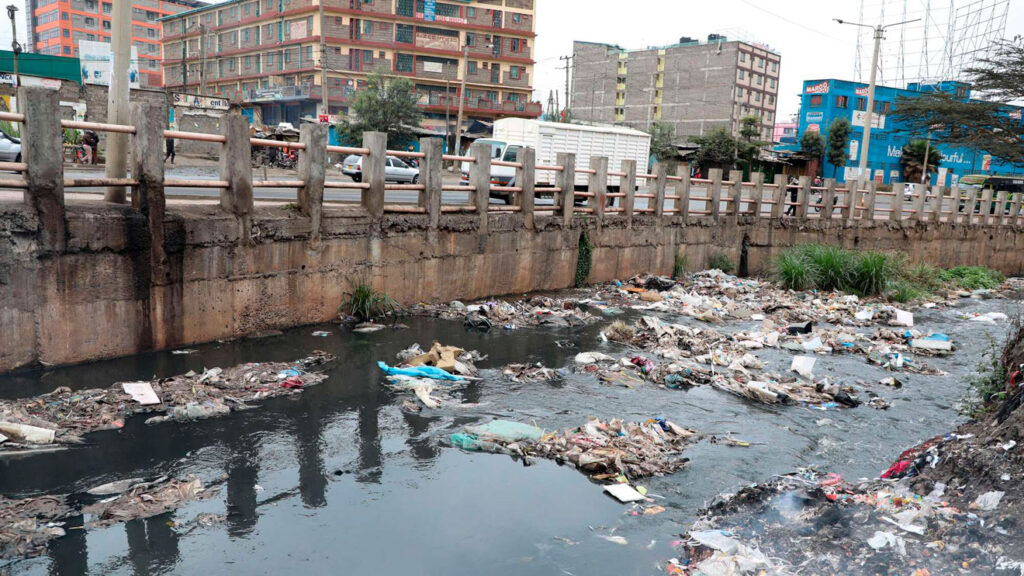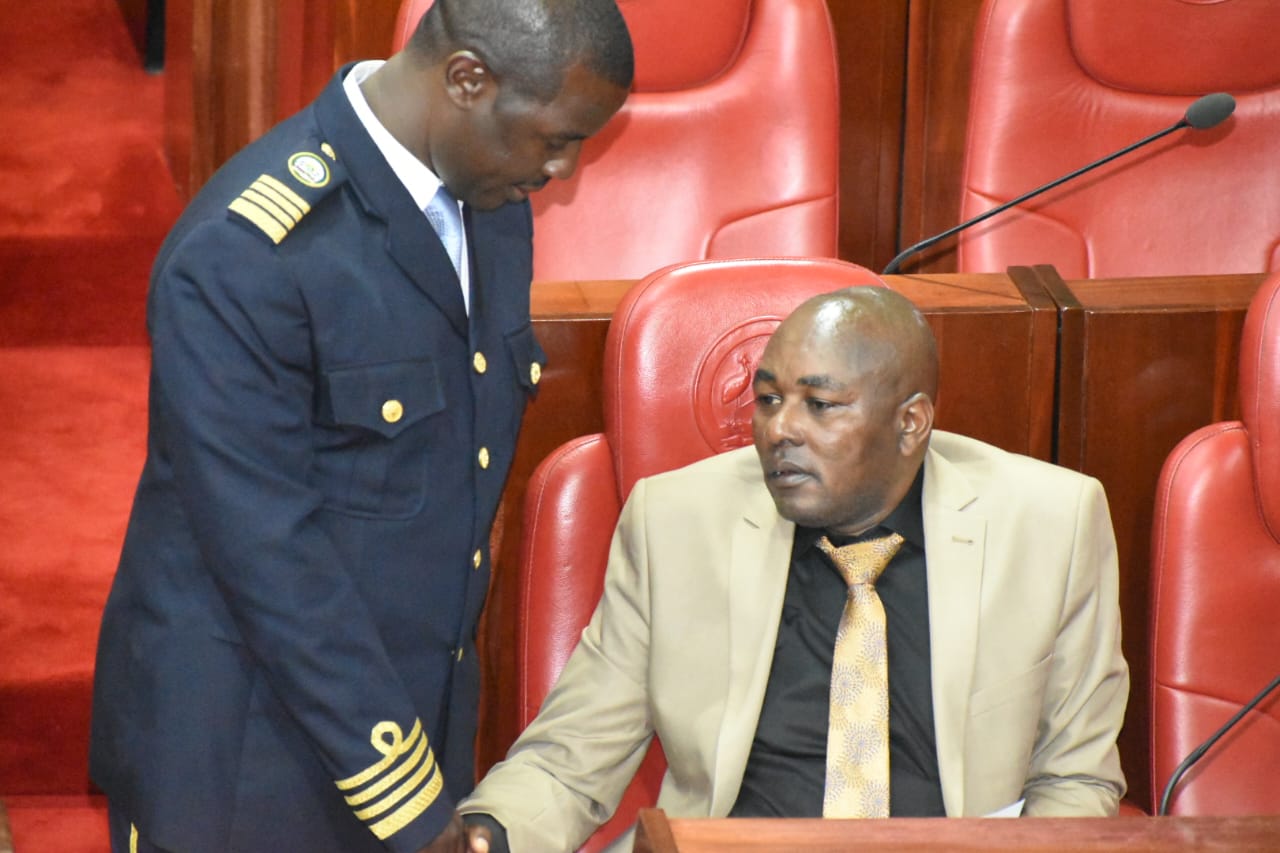Is the Nairobi Rivers Commission another cash cow program?

By Erick Ludeya
When President William Ruto unveiled the Nairobi Rivers Commision in February this year, optimism swept around among residents and environment stakeholders that the government was keen on salvaging the disastrous state of rivers flowing through the capital city.
The launch of the seven member committee was seen as part of the government’s plan to clean up Nairobi city and make it one of the cleanest cities in the world.
The President named Pamela Olet as the chairperson of the commission,Eva Muhia – Representing Riverine Communities, Elizabeth Wathuti – Representing Civil Society, Carlota Dal Lago – Representing the Private Sector, Elijah Biama – Representing Academia and Duncan Ojwang – Representing Academia.
The President declared that a whooping Sh22 billion was availed to expand the Nairobi City County Sewer System to service the growing housing projects in the city.
The President put on notice those who pollute rivers in the city, noting that their days were numbered.
It is nine months down the line and the more things change, the more they remain the same.
A walk down Michuki Park along Kijabe Street leads you to a pungent smell emanating from the Nairobi River.
The Nairobi River and its tributaries, the Ngong and Mathare rivers, remain in bad shape. As these rivers flow through the city, home to over 5 million inhabitants, their waters suffer from pollution caused by both solid waste and toxic wastewater.
Along their course, the rivers pass through formal and informal settlements, markets and industrial areas, gathering all the waste disposed of and collected in open sewers. When the rains fall, all this waste is directed toward the rivers, which ultimately supply water for drinking, washing and agriculture downstream.
With the city’s population projected to rapidly increase in the coming years, these already grave challenges are set to escalate further.
Billions have been allocated in the past by the national government through the National Environment Management Authority (NEMA) and a cumulative billions of money by the county government.
Past clean exercises aimed at rehabilitating Nairobi Rivers have ended up being a business venture for those in power with little efforts directed at solving the root cause of the bad state of Nairobi River and the six other rivers flowing through the city.
The rivers have suffered severe degradation in quality due to the illegal dumping of solid waste and the discharge of industrial and household wastewater into open drainage channels. This degradation has created increasingly toxic living conditions along the riverbanks.
In 2021, the government unveiled The Nairobi City Regeneration Programme (NCRP) which was mandated to improve sewer lines within the capital city some of which were constructed about a century ago.
The same year, the Nairobi Metropolitan Service (NMS) which was in charge of the county launched the expansion of sewer lines covering four hundred kilometers in Nairobi County to a budget of about Sh1.6 billion.
Before that,the county government under former Governor Mike Sonko had allocated over Sh500 million for sewer lines rehabilitation and cleanup of Nairobi Rivers.
In 2019,NEMA shut down 12 companies for directing their untreated industrial discharge into rivers and streams within Nairobi.
The agency gave 24 companies improvement orders.
The company’s NEMA shut did not have wastewater pre-treatment systems in place hence discharging raw sewage into the sewer line or into the environment.
According to Water Quality Regulations 2006, companies discharging into the environment are supposed to apply for the annual Effluent Discharge Licenses (EDL) from NEMA after undertaking an annual audit. Those discharging into the sewer line are supposed to apply for discharge permits from Nairobi Water and Sewerage Company if within the city or in the respective Counties.
There is overwhelming evidence the industrial effluent is still visible within the rivers despite the presence of NEMA.
Will Nairobi Rivers Commission deliver?
Senior counsel Ahmednasir Abdullahi is on record hailing President William Ruto for forming the commission but wondered why it was put under Deputy President Rigathi Gachagua and not the environment ministry.
“What happened to the Nairobi River Commission? Creating the Nairobi River Commission was an environmental masterstroke by H.E William Ruto. It fits so well with his climate change crusade on the global stage,” Ahmednasir stated.
Ahmednasir also faulted the appointment of former Kiambu governor Ferdinand Waititu to the commission.
Waititu’s appointment would later be suspended by the High Court following a petition by the Law Society of Kenya (LSK).
The commission announced that cleaning of Nairobi River was set to start this month on the 23rd September, 2023 with focus on clearing solid waste and addressing sewage disposal into the river.
Its strategy entails doing publicity campaigns, community sensitization programmes, and developing a community engagement framework.
Environment experts have already faulted the commission for not doing anything different from past programs that have failed.
In May, Kajiado,Kiambu,Machakos and Makueni counties were co-opted into the commission and the Kenya Defense Forces seconded to it.
The Chief Executive Officer (CEO) of the commission is Brigadier Joseph Muracia of KDF
The commission has created a total of six sub- committees to help it run its affairs.
These are the Committee on Catchment Protection, Riparian and Wetland Protection and Reclamation along Nairobi River Basin,Waste to the River’s and clearance of Clog Waste and Dumpsites
There is also the committee on Industrial and Institutional Waste and Drainage and Hydrology.
Environment activist Margaret Wambui fears that the commission as set up is targeting to flaot tenders aimed at benefiting the rich.
She has called for the disbandement of the commission and its functions put under the environment docket.
Margaret has advised President Ruto to benchmark his plans with what the late John Michuki did when he served as the minister for Environment under the late President Mwai Kibaki.
“Why do we need a commission when we have NEMA and the ministry of environment who have hundreds of reports on how to take care of our rivers?” she questioned.
She is also questioning why industries are still releasing industrial effluent rivers yet NEMA is operating.
“Before you form the commission just tell NEMA to shut these industries and permanently revoke their licenses,” she added.
There is no public information on the amount of money budgeted for the commission apart from the Sh22 billion President Ruto announced in February.
In June,the Public Petitions Committee called for stringent and stern action against industries discharging effluents into rivers within the Nairobi Metropolitan area.
The committee said this after doing a site visit of Athi River in Machakos County where it also further demanded that industries operating without Effluent Treatment Plants (ETPs) along the river be punished.
There is little hope among residents that the commission will live up to its expectations even as heavy rains begin to persist.
With the predicted El Nino rains likely to come, there are also fears that the rivers could burst and the sewage flowing in it to get into estates and working places.





